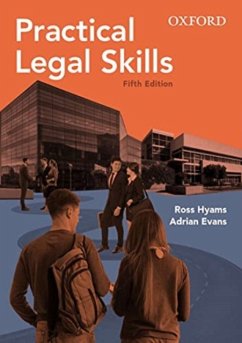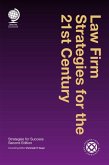Ross Hyams (Associate Professor, Associate Professor, Monash Univer, Adrian Evans (Emeritus Professor, Emeritus Professor, Monash Univer
Practical Legal Skills Fifth Edition
Ross Hyams (Associate Professor, Associate Professor, Monash Univer, Adrian Evans (Emeritus Professor, Emeritus Professor, Monash Univer
Practical Legal Skills Fifth Edition
- Broschiertes Buch
- Merkliste
- Auf die Merkliste
- Bewerten Bewerten
- Teilen
- Produkt teilen
- Produkterinnerung
- Produkterinnerung
Practical Legal Skills for Law Clinics Fifth Edition is a textbook for a Clinical Legal Education subject. It covers the practical skills of lawyering, including interviewing, advising, advocacy, writing and drafting, and negotiation and mediation.
Andere Kunden interessierten sich auch für
![Legal Operations in the Age of AI and Data Legal Operations in the Age of AI and Data]() Legal Operations in the Age of AI and Data236,99 €
Legal Operations in the Age of AI and Data236,99 €![Profitability in Law Firms: Insight and Analysis Profitability in Law Firms: Insight and Analysis]() Toby BrownProfitability in Law Firms: Insight and Analysis236,99 €
Toby BrownProfitability in Law Firms: Insight and Analysis236,99 €![Secrets of the Masters Secrets of the Masters]() David H. FreemanSecrets of the Masters177,99 €
David H. FreemanSecrets of the Masters177,99 €![Rise of the Legal COO Rise of the Legal COO]() Chris BullRise of the Legal COO398,99 €
Chris BullRise of the Legal COO398,99 €![Law Firm Strategies for the 21st Century: Strategies for Success Law Firm Strategies for the 21st Century: Strategies for Success]() Christoph VaagtLaw Firm Strategies for the 21st Century: Strategies for Success114,99 €
Christoph VaagtLaw Firm Strategies for the 21st Century: Strategies for Success114,99 €![The Legal Brain The Legal Brain]() Debra S. Austin (University of Denver)The Legal Brain33,99 €
Debra S. Austin (University of Denver)The Legal Brain33,99 €![Negotiation: A Very Short Introduction Negotiation: A Very Short Introduction]() Carrie Menkel-Meadow (Professor of Law and Unive Political ScienceNegotiation: A Very Short Introduction8,99 €
Carrie Menkel-Meadow (Professor of Law and Unive Political ScienceNegotiation: A Very Short Introduction8,99 €-
-
-
Practical Legal Skills for Law Clinics Fifth Edition is a textbook for a Clinical Legal Education subject. It covers the practical skills of lawyering, including interviewing, advising, advocacy, writing and drafting, and negotiation and mediation.
Hinweis: Dieser Artikel kann nur an eine deutsche Lieferadresse ausgeliefert werden.
Hinweis: Dieser Artikel kann nur an eine deutsche Lieferadresse ausgeliefert werden.
Produktdetails
- Produktdetails
- Verlag: Oxford University Press Australia
- 5 Revised edition
- Seitenzahl: 300
- Erscheinungstermin: 1. November 2021
- Englisch
- Abmessung: 149mm x 209mm x 17mm
- Gewicht: 294g
- ISBN-13: 9780190329839
- ISBN-10: 0190329831
- Artikelnr.: 63116859
- Herstellerkennzeichnung
- Libri GmbH
- Europaallee 1
- 36244 Bad Hersfeld
- gpsr@libri.de
- Verlag: Oxford University Press Australia
- 5 Revised edition
- Seitenzahl: 300
- Erscheinungstermin: 1. November 2021
- Englisch
- Abmessung: 149mm x 209mm x 17mm
- Gewicht: 294g
- ISBN-13: 9780190329839
- ISBN-10: 0190329831
- Artikelnr.: 63116859
- Herstellerkennzeichnung
- Libri GmbH
- Europaallee 1
- 36244 Bad Hersfeld
- gpsr@libri.de
Ross Hyams is a practising solicitor and Law Faculty Director of Work Integrated Learning at Monash University. He worked in private practice as a solicitor in a commercial legal firm from 1987 until 1990. He has taught in the Faculty of Law clinical program since 1990. He was the Coordinator of the Monash-Oakleigh Legal Service from 1990 to 2000 and then, from 2001 to 2005, Director of the Springvale Monash Legal Service. In 2004 he was awarded the Law Institute of Victoria President's Inaugural Community Lawyers' Award in recognition of outstanding contributions made within the legal profession and beyond. Adrian Evans has taught, practised law and consulted in a clinical legal education context for thirty five years at LaTrobe and Monash Universities. He was coordinator of Springvale Legal Service Inc. from 1988-2000, the largest Australian clinical site. He is both an academic and a legal practitioner, with teaching responsibilities in legal systems, legal ethics and clinical case supervision. He has empirically examined and published in relation to law students' and lawyers' values, best practice' ethics for lawyers and law firms, quality' clinical-traditional links in law teaching, client attitudes to lawyers, clinical resourcing, evaluation and assessment, approaches to monitoring and controlling defalcations and the ethical environment in which lawyer's fidelity compensation is addressed locally and internationally, and the virtue ethics implications for legal practice in a struggling and conflicted global legal profession.
CHAPTER 1 INTRODUCTION
The role of skills teaching in legal education
Content and method
The limitations of practical legal training
Enjoying law school
Skills and values
Skills teaching: The distinction between ethical content and process
Teacher and mentor values
Good ethics does not mean being squeamish
Learning with this book
CHAPTER 2 INTERVIEWING: LISTENING AND QUESTIONING
Introduction
The structure of an interview
The three-stage process of interviewing
Ethical dangers in interviewing
Conclusion
CHAPTER 3 INTERVIEWING: ADVISING
Summarising the facts
Giving advice
Techniques for arriving at decisions
Barriers to communication
Professional rules and ethical considerations
Conclusion
CHAPTER 4 KEEPING OUT OF TROUBLE
Introduction
What sorts of ethical problems exist?
Common ethical problem areas
Dealing with Online Security
Conclusion
CHAPTER 5 WRITING AND DRAFTING
Introduction
Communication in writing: Why is it different?
Emails and other electronic communication methods
Document retention
Essential preliminaries
Ethical issues in letter writing
How to produce good 'plain English'
Words and sentences
Structuring a letter
Reports, memoranda, and other in-house documents
Drafting legal documents
Conclusion
CHAPTER 6 NEGOTIATION AND MEDIATION
Introduction
Negotiating
Mediation
Collaborative law
Conclusion
CHAPTER 7 ADVOCACY
Introduction
The objective of advocacy
Mainstream Magistrates/Local Court: Guilty pleas
Federal Circuit Court of Australia: Application to dispense with service
Supreme Court: Interlocutory applications
Conclusion
The role of skills teaching in legal education
Content and method
The limitations of practical legal training
Enjoying law school
Skills and values
Skills teaching: The distinction between ethical content and process
Teacher and mentor values
Good ethics does not mean being squeamish
Learning with this book
CHAPTER 2 INTERVIEWING: LISTENING AND QUESTIONING
Introduction
The structure of an interview
The three-stage process of interviewing
Ethical dangers in interviewing
Conclusion
CHAPTER 3 INTERVIEWING: ADVISING
Summarising the facts
Giving advice
Techniques for arriving at decisions
Barriers to communication
Professional rules and ethical considerations
Conclusion
CHAPTER 4 KEEPING OUT OF TROUBLE
Introduction
What sorts of ethical problems exist?
Common ethical problem areas
Dealing with Online Security
Conclusion
CHAPTER 5 WRITING AND DRAFTING
Introduction
Communication in writing: Why is it different?
Emails and other electronic communication methods
Document retention
Essential preliminaries
Ethical issues in letter writing
How to produce good 'plain English'
Words and sentences
Structuring a letter
Reports, memoranda, and other in-house documents
Drafting legal documents
Conclusion
CHAPTER 6 NEGOTIATION AND MEDIATION
Introduction
Negotiating
Mediation
Collaborative law
Conclusion
CHAPTER 7 ADVOCACY
Introduction
The objective of advocacy
Mainstream Magistrates/Local Court: Guilty pleas
Federal Circuit Court of Australia: Application to dispense with service
Supreme Court: Interlocutory applications
Conclusion
CHAPTER 1 INTRODUCTION
The role of skills teaching in legal education
Content and method
The limitations of practical legal training
Enjoying law school
Skills and values
Skills teaching: The distinction between ethical content and process
Teacher and mentor values
Good ethics does not mean being squeamish
Learning with this book
CHAPTER 2 INTERVIEWING: LISTENING AND QUESTIONING
Introduction
The structure of an interview
The three-stage process of interviewing
Ethical dangers in interviewing
Conclusion
CHAPTER 3 INTERVIEWING: ADVISING
Summarising the facts
Giving advice
Techniques for arriving at decisions
Barriers to communication
Professional rules and ethical considerations
Conclusion
CHAPTER 4 KEEPING OUT OF TROUBLE
Introduction
What sorts of ethical problems exist?
Common ethical problem areas
Dealing with Online Security
Conclusion
CHAPTER 5 WRITING AND DRAFTING
Introduction
Communication in writing: Why is it different?
Emails and other electronic communication methods
Document retention
Essential preliminaries
Ethical issues in letter writing
How to produce good 'plain English'
Words and sentences
Structuring a letter
Reports, memoranda, and other in-house documents
Drafting legal documents
Conclusion
CHAPTER 6 NEGOTIATION AND MEDIATION
Introduction
Negotiating
Mediation
Collaborative law
Conclusion
CHAPTER 7 ADVOCACY
Introduction
The objective of advocacy
Mainstream Magistrates/Local Court: Guilty pleas
Federal Circuit Court of Australia: Application to dispense with service
Supreme Court: Interlocutory applications
Conclusion
The role of skills teaching in legal education
Content and method
The limitations of practical legal training
Enjoying law school
Skills and values
Skills teaching: The distinction between ethical content and process
Teacher and mentor values
Good ethics does not mean being squeamish
Learning with this book
CHAPTER 2 INTERVIEWING: LISTENING AND QUESTIONING
Introduction
The structure of an interview
The three-stage process of interviewing
Ethical dangers in interviewing
Conclusion
CHAPTER 3 INTERVIEWING: ADVISING
Summarising the facts
Giving advice
Techniques for arriving at decisions
Barriers to communication
Professional rules and ethical considerations
Conclusion
CHAPTER 4 KEEPING OUT OF TROUBLE
Introduction
What sorts of ethical problems exist?
Common ethical problem areas
Dealing with Online Security
Conclusion
CHAPTER 5 WRITING AND DRAFTING
Introduction
Communication in writing: Why is it different?
Emails and other electronic communication methods
Document retention
Essential preliminaries
Ethical issues in letter writing
How to produce good 'plain English'
Words and sentences
Structuring a letter
Reports, memoranda, and other in-house documents
Drafting legal documents
Conclusion
CHAPTER 6 NEGOTIATION AND MEDIATION
Introduction
Negotiating
Mediation
Collaborative law
Conclusion
CHAPTER 7 ADVOCACY
Introduction
The objective of advocacy
Mainstream Magistrates/Local Court: Guilty pleas
Federal Circuit Court of Australia: Application to dispense with service
Supreme Court: Interlocutory applications
Conclusion








